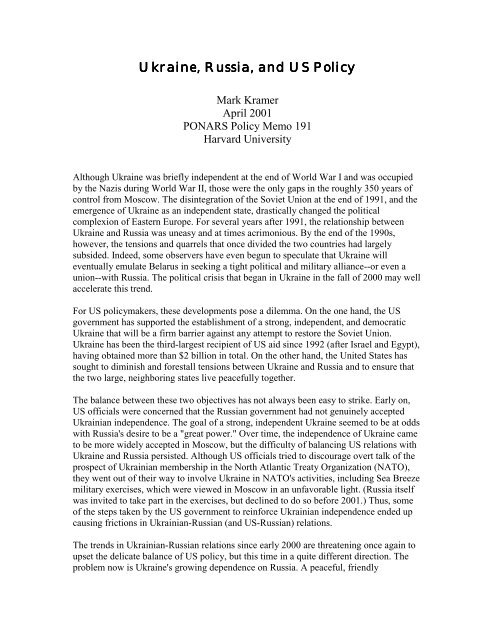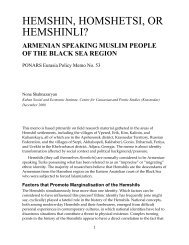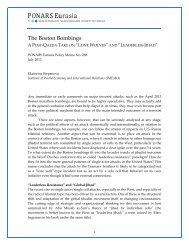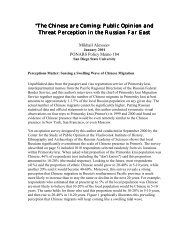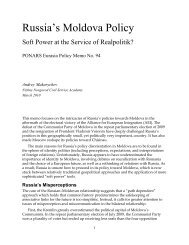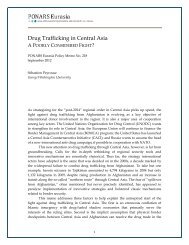Ukraine, Russia, and US Policy
Ukraine, Russia, and US Policy
Ukraine, Russia, and US Policy
Create successful ePaper yourself
Turn your PDF publications into a flip-book with our unique Google optimized e-Paper software.
<strong>Ukraine</strong>, <strong>Russia</strong>, <strong>and</strong> <strong>US</strong> <strong>Policy</strong><br />
Mark Kramer<br />
April 2001<br />
PONARS <strong>Policy</strong> Memo 191<br />
Harvard University<br />
Although <strong>Ukraine</strong> was briefly independent at the end of World War I <strong>and</strong> was occupied<br />
by the Nazis during World War II, those were the only gaps in the roughly 350 years of<br />
control from Moscow. The disintegration of the Soviet Union at the end of 1991, <strong>and</strong> the<br />
emergence of <strong>Ukraine</strong> as an independent state, drastically changed the political<br />
complexion of Eastern Europe. For several years after 1991, the relationship between<br />
<strong>Ukraine</strong> <strong>and</strong> <strong>Russia</strong> was uneasy <strong>and</strong> at times acrimonious. By the end of the 1990s,<br />
however, the tensions <strong>and</strong> quarrels that once divided the two countries had largely<br />
subsided. Indeed, some observers have even begun to speculate that <strong>Ukraine</strong> will<br />
eventually emulate Belarus in seeking a tight political <strong>and</strong> military alliance--or even a<br />
union--with <strong>Russia</strong>. The political crisis that began in <strong>Ukraine</strong> in the fall of 2000 may well<br />
accelerate this trend.<br />
For <strong>US</strong> policymakers, these developments pose a dilemma. On the one h<strong>and</strong>, the <strong>US</strong><br />
government has supported the establishment of a strong, independent, <strong>and</strong> democratic<br />
<strong>Ukraine</strong> that will be a firm barrier against any attempt to restore the Soviet Union.<br />
<strong>Ukraine</strong> has been the third-largest recipient of <strong>US</strong> aid since 1992 (after Israel <strong>and</strong> Egypt),<br />
having obtained more than $2 billion in total. On the other h<strong>and</strong>, the United States has<br />
sought to diminish <strong>and</strong> forestall tensions between <strong>Ukraine</strong> <strong>and</strong> <strong>Russia</strong> <strong>and</strong> to ensure that<br />
the two large, neighboring states live peacefully together.<br />
The balance between these two objectives has not always been easy to strike. Early on,<br />
<strong>US</strong> officials were concerned that the <strong>Russia</strong>n government had not genuinely accepted<br />
Ukrainian independence. The goal of a strong, independent <strong>Ukraine</strong> seemed to be at odds<br />
with <strong>Russia</strong>'s desire to be a "great power." Over time, the independence of <strong>Ukraine</strong> came<br />
to be more widely accepted in Moscow, but the difficulty of balancing <strong>US</strong> relations with<br />
<strong>Ukraine</strong> <strong>and</strong> <strong>Russia</strong> persisted. Although <strong>US</strong> officials tried to discourage overt talk of the<br />
prospect of Ukrainian membership in the North Atlantic Treaty Organization (NATO),<br />
they went out of their way to involve <strong>Ukraine</strong> in NATO's activities, including Sea Breeze<br />
military exercises, which were viewed in Moscow in an unfavorable light. (<strong>Russia</strong> itself<br />
was invited to take part in the exercises, but declined to do so before 2001.) Thus, some<br />
of the steps taken by the <strong>US</strong> government to reinforce Ukrainian independence ended up<br />
causing frictions in Ukrainian-<strong>Russia</strong>n (<strong>and</strong> <strong>US</strong>-<strong>Russia</strong>n) relations.<br />
The trends in Ukrainian-<strong>Russia</strong>n relations since early 2000 are threatening once again to<br />
upset the delicate balance of <strong>US</strong> policy, but this time in a quite different direction. The<br />
problem now is <strong>Ukraine</strong>'s growing dependence on <strong>Russia</strong>. A peaceful, friendly
Program on New Approaches to <strong>Russia</strong>n Security<br />
Kramer<br />
relationship between <strong>Ukraine</strong> <strong>and</strong> <strong>Russia</strong> is highly desirable, but a relationship that<br />
compromises Ukrainian independence would be undesirable. Although the situation has<br />
not yet resulted in a stark tradeoff of this sort, tough choices for the <strong>US</strong> government may<br />
lie ahead.<br />
Change of Political Mood<br />
During the first few years after the Soviet Union collapsed, relations between <strong>Ukraine</strong><br />
<strong>and</strong> <strong>Russia</strong> often were extremely tense. The first Ukrainian president, Leonid Kravchuk,<br />
did his best to mitigate <strong>Russia</strong>n influence in <strong>Ukraine</strong>. Issues such as the disposition of<br />
nuclear weapons based on Ukrainian territory, the fate of the Black Sea fleet, the political<br />
status of Crimea, the flow of oil <strong>and</strong> natural gas from <strong>Russia</strong>, <strong>and</strong> the reallocation of<br />
Soviet-era foreign debt sparked acute bilateral friction. Although ties between Kiev <strong>and</strong><br />
Moscow gradually improved after Leonid Kuchma was elected president in mid-1994,<br />
the relationship was marked by chronic tensions throughout the 1990s. <strong>Russia</strong>n officials<br />
reacted adversely to what they perceived as a growing "tilt" by <strong>Ukraine</strong> toward the West.<br />
Whenever Ukrainian leaders hinted that they might someday be interested in joining<br />
NATO, the <strong>Russia</strong>n government sought, both publicly <strong>and</strong> privately, to deter such a<br />
move.<br />
Sentiment in <strong>Ukraine</strong> remained broadly pro-Western until 1999, when the NATO<br />
operation in Kosovo changed many Ukrainians' perceptions of the Western alliance.<br />
Surveys conducted in <strong>Ukraine</strong> by the Kiev International Institute of Sociology (KMIS) in<br />
1999 revealed that the favorable public attitudes toward NATO shifted, with surprising<br />
speed, in a distinctly anti-Western direction. As of mid-1999, a large majority (upward of<br />
61 percent) of Ukrainians voiced a "lack of confidence" <strong>and</strong> "lack of trust" in NATO, <strong>and</strong><br />
only about 15 percent expressed "confidence." Although the level of "confidence" <strong>and</strong><br />
"trust" rose slightly in 2000, it remained far below the level of the early to mid-1990s. By<br />
the same token, Ukrainians' attitudes toward <strong>Russia</strong> became decidedly more positive, in<br />
part because the <strong>Russia</strong>n government took a strong stance against NATO action in<br />
Kosovo.<br />
This shift of mood in <strong>Ukraine</strong> was evident among ethnic Ukrainians as well as among<br />
other groups (not least those of <strong>Russia</strong>n descent), <strong>and</strong> the trend continued in 2000, despite<br />
the start of <strong>Russia</strong>'s second war against Chechnya in September 1999. A KMIS survey of<br />
1,198 adult citizens in <strong>Ukraine</strong> in October 2000 found that 75% described their view of<br />
<strong>Russia</strong> as "favorable," 69% expressed a "favorable" view of Vladimir Putin, <strong>and</strong> 61%<br />
want <strong>Ukraine</strong> to join a "union" with <strong>Russia</strong> <strong>and</strong> Belarus. The precise nature of this<br />
"union" was somewhat ambiguous, but a substantial minority of respondents--40%--<br />
voiced support for the full re-merger of <strong>Russia</strong> <strong>and</strong> <strong>Ukraine</strong> into a single country. When<br />
Ukrainians were asked whether <strong>Ukraine</strong> should seek closer security relations with <strong>Russia</strong><br />
<strong>and</strong> the Commonwealth of Independent States (CIS) or with the United States <strong>and</strong><br />
NATO, 52% chose <strong>Russia</strong> <strong>and</strong> the CIS, whereas only 14% chose the United States <strong>and</strong><br />
NATO. (Another 26 percent said that <strong>Ukraine</strong> should seek a balance between the two.)<br />
All of these findings, which have been repeated in subsequent polls, signaled a marked<br />
2
Program on New Approaches to <strong>Russia</strong>n Security<br />
Kramer<br />
shift from results compiled in the mid-1990s, when almost no Ukrainians expressed<br />
interest in rejoining <strong>Russia</strong> <strong>and</strong> when a substantial minority supported Ukrainian<br />
membership in (or at least affiliation with) NATO. Even among ethnic <strong>Russia</strong>ns in<br />
eastern <strong>Ukraine</strong>, only a very small minority in earlier years had hoped that <strong>Ukraine</strong> would<br />
be re-merged with <strong>Russia</strong>.<br />
The new public mood in <strong>Ukraine</strong> is partly attributable to the country's huge economic<br />
problems <strong>and</strong> pervasive corruption, which make <strong>Russia</strong> seem relatively well off (<strong>and</strong><br />
better poised to do well in the future) by comparison. The change may also reflect a<br />
growing public awareness that <strong>Ukraine</strong>'s economic dependence on <strong>Russia</strong> has been<br />
rapidly increasing. The Ukrainian economy is one of the most energy-intensive in the<br />
world, but <strong>Ukraine</strong> lacks energy reserves of its own other than coal <strong>and</strong> a troubled nuclear<br />
power program. The vast bulk of <strong>Ukraine</strong>'s natural gas <strong>and</strong> oil comes from <strong>Russia</strong>, <strong>and</strong><br />
the remainder of the gas that comes from Turkmenistan is re-exported by the Itera<br />
company (an offshoot of Gazprom) through <strong>Russia</strong>n pipelines. Payments to <strong>Russia</strong>n<br />
suppliers lagged throughout the 1990s, but over the past year Itera/Gazprom <strong>and</strong> other<br />
<strong>Russia</strong>n energy companies have dem<strong>and</strong>ed the settlement of long-st<strong>and</strong>ing debts <strong>and</strong><br />
have cut off supplies if payments were not forthcoming. <strong>Russia</strong>n officials have also<br />
insisted that the Ukrainian government halt its practice of illegally siphoning off gas from<br />
<strong>Russia</strong>n-owned pipelines that pass through <strong>Ukraine</strong>. The prospect of a new pipeline that<br />
will run through Belarus <strong>and</strong> Pol<strong>and</strong> or through Finl<strong>and</strong> while bypassing <strong>Ukraine</strong> has<br />
been emphasized by the <strong>Russia</strong>n government to convince Ukrainian leaders that such<br />
diversions of energy supplies will no longer be tolerated.<br />
Exploiting this pressure, <strong>Russia</strong>n companies have managed to buy large equity stakes in<br />
key sectors of the Ukrainian economy, including banks, oil refineries, <strong>and</strong> steel plants.<br />
Entire industries in <strong>Ukraine</strong> (notably aluminum smelting) have been transferred to<br />
<strong>Russia</strong>n control--in some cases over the Ukrainian government's objections--in exchange<br />
for the cancellation of energy-related debts. The trend toward <strong>Russia</strong>n ownership of<br />
Ukrainian companies shows no signs of abating.<br />
Increased Official Cooperation<br />
At the governmental level, too, cooperation between <strong>Ukraine</strong> <strong>and</strong> <strong>Russia</strong> has increased<br />
conspicuously since late 2000. In mid-January 2001, Marshal Igor Sergeyev, who was<br />
then <strong>Russia</strong>n defense minister, visited Kiev <strong>and</strong> signed a 52-point military cooperation<br />
accord providing for the creation of a small (5-warship) joint naval force that will engage<br />
in bilateral maneuvers <strong>and</strong> training. Despite the limited size of the force, the political<br />
symbolism of it is unmistakable. The agreement also gives the <strong>Russia</strong>n defense ministry a<br />
role in the planning of international military exercises held on Ukrainian territory.<br />
Although <strong>Russia</strong> will not have a veto on such exercises or on <strong>Ukraine</strong>'s participation in<br />
maneuvers elsewhere, the sharing of responsibility for military planning is a major<br />
departure from <strong>Ukraine</strong>'s earlier wariness of <strong>Russia</strong>.<br />
3
Program on New Approaches to <strong>Russia</strong>n Security<br />
Kramer<br />
In addition, Sergeyev reached agreement in principle on the establishment of a joint naval<br />
search-<strong>and</strong>-rescue unit <strong>and</strong> on the creation of a joint naval policing <strong>and</strong> navigation force<br />
for harbors around the Black Sea. Although American officials have claimed that the<br />
<strong>Russia</strong>n-Ukrainian harbor police force, once established, will have "no authority to allow<br />
or prohibit [Western] ships from entering harbors," some <strong>Russia</strong>n <strong>and</strong> Ukrainian officials<br />
have suggested otherwise.<br />
Sergeyev's visit also paved the way for a large array of joint <strong>Russia</strong>n-Ukrainian efforts to<br />
produce military technology. These efforts include some of the latest weapons deployed<br />
by the two countries as well as hardware produced for export. (Both countries have been<br />
eager to sell more weapons abroad for hard currency.) The agreement specifically<br />
provides for cooperation in missile technology <strong>and</strong> the production of space-launch<br />
vehicles. It also covers strategic air defense systems, tanks, multiple rocket launchers,<br />
radars, frigates, cruisers, destroyers, <strong>and</strong> military transport aircraft, including the An-70.<br />
The importance of the agreements was underscored by the new Ukrainian foreign<br />
minister, Anatoly Zlenko, in an interview shortly after Sergeyev's visit: "For a certain<br />
period of time, our relations with <strong>Russia</strong> were not normal. Now our relations are being<br />
normalized. So, it may seem that we are sharply strengthening the eastern vector of our<br />
foreign policy." Zlenko's predecessor, Borys Tarasyuk, had incurred <strong>Russia</strong>'s displeasure<br />
because of his staunchly pro-NATO leanings. Under pressure from Moscow, Kuchma<br />
had agreed in the fall of 2000 to bring in Zlenko, who promptly set about revising<br />
<strong>Ukraine</strong>'s external policies. His comments about the new bilateral agreements were<br />
echoed by a high-ranking official in the <strong>Russia</strong>n defense ministry, General Leonid<br />
Ivashov, who emphasized that the two countries could now "jointly parry foreign<br />
threats." Marshal Sergeyev himself also played up the anti-NATO thrust of the<br />
agreements, arguing that "<strong>Russia</strong> objects to NATO's eastward expansion…The danger is<br />
coming from the south, but NATO is exp<strong>and</strong>ing eastward. That is what worries <strong>Russia</strong>."<br />
A month after Sergeyev's visit, Putin himself traveled to <strong>Ukraine</strong> for high-level<br />
consultations, including a summit meeting with Kuchma in Dnipropetrovsk. The two<br />
presidents signed numerous agreements, including one providing for further aerospace<br />
cooperation (in production of satellite boosters, etc.) <strong>and</strong> another authorizing United<br />
Energy System (UES), the giant <strong>Russia</strong>n electricity company, to reunify the <strong>Russia</strong>n <strong>and</strong><br />
Ukrainian electricity grids <strong>and</strong> reintegrate the two countries' energy markets. Another<br />
agreement enabled <strong>Russia</strong>n companies to take part in the destruction of ICBMs left on<br />
Ukrainian territory, as m<strong>and</strong>ated by the Strategic Arms Reduction Treaties. The United<br />
States has been paying for the dismantling of these delivery vehicles through the<br />
Cooperative Threat Reduction program, which provides a tempting stream of revenue.<br />
Although most of the agreements signed by Putin <strong>and</strong> Kuchma were important mainly for<br />
their symbolism rather than their substance, the meeting dramatically conveyed the new,<br />
much closer relationship that <strong>Russia</strong> has now forged with <strong>Ukraine</strong>. Although Ukrainian<br />
leaders would not necessarily agree with Putin's assertion that <strong>Ukraine</strong> is in <strong>Russia</strong>'s<br />
"sphere of influence," they undoubtedly would concur with Ivashov's judgment that<br />
4
Program on New Approaches to <strong>Russia</strong>n Security<br />
Kramer<br />
"<strong>Russia</strong> <strong>and</strong> <strong>Ukraine</strong> can present a common front of stability <strong>and</strong> security in Europe to<br />
help cope with uncertainty about hostile powers."<br />
Options for <strong>US</strong> <strong>Policy</strong><br />
The Ukrainian-<strong>Russia</strong>n relationship <strong>and</strong> the <strong>US</strong>-Ukrainian relationship have been<br />
complicated by the political sc<strong>and</strong>al that has engulfed <strong>Ukraine</strong> for the past several<br />
months. In late November 2000, a Ukrainian parliamentarian obtained <strong>and</strong> made public<br />
tape recordings that show Kuchma in an extremely unfavorable light. The recordings<br />
disclose, in the president's own voice, that he <strong>and</strong> his staff engaged in systematic<br />
corruption <strong>and</strong> illegality, including murder <strong>and</strong> other violent attacks. Although Kuchma<br />
has denied the allegations, the evidence is heavily against him. The sc<strong>and</strong>al has led to<br />
considerable ferment <strong>and</strong> unrest in <strong>Ukraine</strong>, <strong>and</strong> Kuchma has been increasingly isolated.<br />
The political opposition <strong>and</strong> many ordinary citizens have dem<strong>and</strong>ed that Kuchma resign,<br />
but he has refused.<br />
One of the effects of the political crisis in <strong>Ukraine</strong> has been the incentive it has given to<br />
Kuchma to strengthen ties with <strong>Russia</strong>, not least because of the remarkably widespread<br />
popularity that Putin enjoys among Ukrainians. (Putin's favorable ratings among<br />
Ukrainians are roughly twelve times higher than those of his predecessor, Boris Yeltsin.)<br />
Although Kuchma's own popularity has plummeted at home, Putin's st<strong>and</strong>ing in <strong>Ukraine</strong><br />
has remained as high as it was in October 2000, when the KMIS polling data (cited<br />
above) were gathered. The meeting in Dnipropetrovsk was driven in part by Kuchma's<br />
desire to seek a buffer against political criticism at home <strong>and</strong> to project himself as a<br />
vigorous leader on the world stage.<br />
For the United States, the political uncertainty in <strong>Ukraine</strong> has magnified the dilemma<br />
posed by recent trends in Ukrainian-<strong>Russia</strong>n relations. Critics of the Clinton<br />
administration have charged, quite rightly, that the administration turned a blind eye to<br />
corruption <strong>and</strong> criminality in <strong>Ukraine</strong> throughout the 1990s to avoid causing difficulty for<br />
the huge <strong>US</strong> aid program. Perceived geopolitical needs outweighed concerns about<br />
wrongdoing. The current sc<strong>and</strong>al in <strong>Ukraine</strong> is testing whether the Bush administration is<br />
inclined to act any differently. So far, the United States <strong>and</strong> most other Western countries<br />
have been reluctant to condemn Kuchma in public, for fear that even mild criticism will<br />
push the Ukrainian leader even more firmly into <strong>Russia</strong>'s embrace. Although <strong>US</strong> officials<br />
have expressed "disappointment" with the pace of the Ukrainian government's<br />
investigation (an investigation widely regarded as a sham), they have eschewed any<br />
harsher comments. The administration also has avoided any suggestion that it will link<br />
the continuation of <strong>US</strong> aid with a satisfactory resolution of the crisis. (By contrast, all <strong>US</strong><br />
aid programs for <strong>Russia</strong> are under review, as indeed they should be. At least some of<br />
these programs should be terminated.)<br />
Important as the recent trends in Ukrainian-<strong>Russia</strong>n relations may be, the <strong>US</strong> government<br />
would be well advised to take a stronger stance on behalf of democracy in <strong>Ukraine</strong>.<br />
Although the United States must not try to dictate what the Ukrainian people ought to do,<br />
5
Program on New Approaches to <strong>Russia</strong>n Security<br />
Kramer<br />
American leaders should not hesitate to condemn, as openly <strong>and</strong> forcefully as possible,<br />
the egregious abuses committed by Kuchma, including his jailing of a prominent member<br />
of the opposition, Yulia Tymoshenko. Although the criticism may give Kuchma a pretext<br />
to seek even closer ties with <strong>Russia</strong>, the effect is likely to be only temporary. A "union"<br />
between <strong>Russia</strong> <strong>and</strong> <strong>Ukraine</strong> would be very troubling, but it will be far less likely to<br />
occur if a more democratic <strong>and</strong> less corrupt government comes to power in Kiev.<br />
By siding with the forces of democracy in <strong>Ukraine</strong> rather than sticking by the corrupt <strong>and</strong><br />
increasingly autocratic Kuchma, the United States will pave the way for a more salutary<br />
relationship with the post-Kuchma government. A forthright stance by the United States<br />
will also give ordinary Ukrainians, including young people, a clearer sense that Western<br />
countries want to encourage genuine democracy <strong>and</strong> prosperity in <strong>Ukraine</strong>. By altering<br />
elite <strong>and</strong> public perceptions in <strong>Ukraine</strong>, the United States will facilitate the restoration of<br />
a more balanced Ukrainian-<strong>Russia</strong>n relationship.<br />
Implications for <strong>Russia</strong><br />
The situation in <strong>Ukraine</strong> poses challenges for <strong>Russia</strong> as well as for the United States.<br />
Putin's efforts to increase <strong>Ukraine</strong>'s dependence on <strong>Russia</strong> at a time of great domestic<br />
uncertainty in <strong>Ukraine</strong> may backfire after Kuchma is gone. Although the domestic<br />
climate in <strong>Ukraine</strong> is more conducive to close ties with <strong>Russia</strong> now than at any time in<br />
the past, the friendlier atmosphere is likely to deteriorate once Ukrainians realize how<br />
great a role <strong>Russia</strong> has come to play in their country's affairs. Some <strong>Russia</strong>n<br />
commentators have predicted, rather disingenuously, that <strong>Ukraine</strong> will divide along<br />
ethnic <strong>and</strong> territorial lines. There is little reason to believe that a "worst-case" scenario<br />
will actually occur, but there is ample reason to be concerned about an adverse reaction in<br />
some parts of <strong>Ukraine</strong> (especially in the western provinces) if <strong>Ukraine</strong>'s dependence on<br />
<strong>Russia</strong> continues to increase.<br />
Hence, the <strong>Russia</strong>n government would be better off in the long run if it distanced itself<br />
from Kuchma <strong>and</strong> refrained from exploiting the situation for short-term benefit. Although<br />
the tactics used by Kuchma have been commonly used in <strong>Russia</strong>, the evidence of<br />
Kuchma's involvement in extralegal violence <strong>and</strong> corruption is too blatant to disregard.<br />
Many observers are underst<strong>and</strong>ably skeptical about Putin's proclaimed desire to establish<br />
law <strong>and</strong> order at home; <strong>and</strong> their doubts will merely be confirmed if the current policy<br />
toward <strong>Ukraine</strong> continues. By contrast, a forthright condemnation of the abuses in<br />
<strong>Ukraine</strong> might signal a shift--perhaps only a small <strong>and</strong> tenuous shift, but a positive one<br />
nonetheless--in Putin's priorities.<br />
Rather than seeking to bring <strong>Ukraine</strong> into a united front against NATO, the <strong>Russia</strong>n<br />
government would be better off seeking improved ties with NATO <strong>and</strong> a more equitable<br />
relationship with <strong>Ukraine</strong>. Relations between NATO <strong>and</strong> <strong>Russia</strong> have remained frigid<br />
since the Kosovo conflict, despite the resumption of formal ties. If <strong>Russia</strong> worked with<br />
the alliance via the triangular NATO-<strong>Russia</strong>-<strong>Ukraine</strong> relationship, the prospects for a<br />
durable improvement in relations with both parts of the triangle would be much greater.<br />
6
Program on New Approaches to <strong>Russia</strong>n Security<br />
Kramer<br />
© PONARS 2001<br />
7


